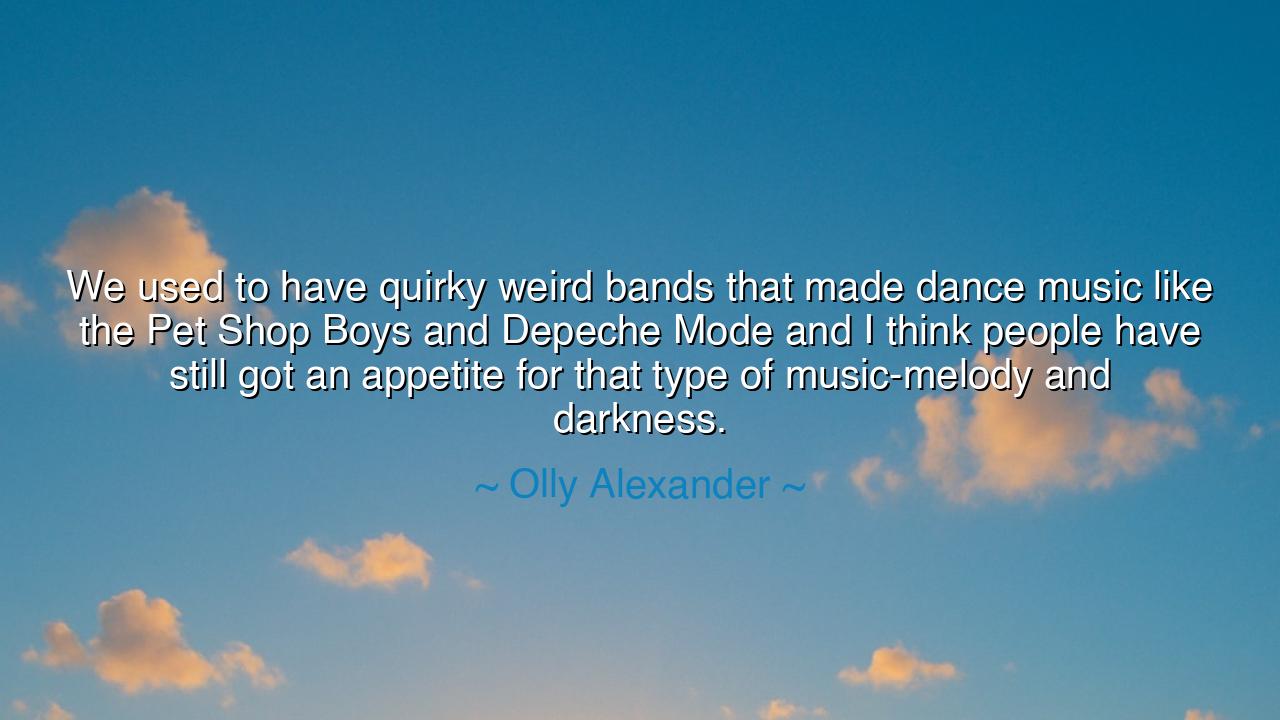
We used to have quirky weird bands that made dance music like
We used to have quirky weird bands that made dance music like the Pet Shop Boys and Depeche Mode and I think people have still got an appetite for that type of music-melody and darkness.






When Olly Alexander declared, “We used to have quirky weird bands that made dance music like the Pet Shop Boys and Depeche Mode, and I think people have still got an appetite for that type of music—melody and darkness,” he was not merely reflecting on pop history, but voicing a timeless truth about the human spirit. His words remind us that art thrives on paradox: that joy often walks hand in hand with sorrow, that melody sweetens the sting of darkness, and that strangeness and eccentricity often give birth to what is most lasting in culture.
The quirky weird bands he names—Pet Shop Boys and Depeche Mode—were more than entertainers. They were alchemists, mixing the beat of the nightclub with the shadows of longing, alienation, and desire. Their dance music did not only lift the body into motion; it also stirred the soul with undertones of melancholy. To dance to such music was to be caught between light and shadow, between celebration and confession. Alexander reminds us that this tension is not an accident, but a need: the human heart hungers not only for brightness, but also for the resonance of sorrow.
History confirms this marriage of melody and darkness. Consider the blues of the American South, born of suffering, yet sung with rhythm and groove that made feet move even as hearts ached. Or think of Beethoven, whose Ninth Symphony soars with triumphant joy, yet was written by a man tormented by silence and despair. Across ages, we find the same pattern: when music acknowledges both pain and joy, it becomes universal, able to touch the depths of the listener’s soul.
The origin of this style of music lies in cultural rebellion. In the 1980s, when Depeche Mode and the Pet Shop Boys rose to prominence, pop music often celebrated glamour, surface, and shine. These bands, however, infused their work with irony, shadows, and depth. They became voices for the outsiders—the ones who felt different, who sought meaning beyond the polished smile of mainstream pop. Their music was proof that strangeness itself could become beauty, that the world’s misfits could find anthems in synths and beats.
What Alexander calls an enduring appetite is in truth a hunger for honesty. People crave songs that reflect the complexity of life. They do not want only sugar, for sweetness alone soon grows cloying. They crave the mingling of light and shade, the way melody softens truth but does not erase it. This is why, even decades later, the music of those “quirky weird bands” still resonates: it speaks to both the dancing body and the restless soul.
The lesson is clear: do not shy away from the strange, the offbeat, the mixture of joy and sorrow. For in strangeness lies originality, and in the embrace of darkness alongside melody lies truth. The artist’s task is not to pretend that life is only light, but to weave together the full spectrum of human experience into sound, image, and word. Those who dare to do so may be called “weird,” but they will leave a legacy far greater than those who only conform.
In practical action, this means: embrace your own quirks, your own contradictions. When you create, allow both your joy and your sorrow to have a voice. When you listen to music, seek not only what pleases but also what challenges, what unsettles, what makes you reflect. And when you live, do not fear the shadows that walk with you—for they, too, give depth to the light.
Thus Olly Alexander’s words carry forward an ancient truth dressed in the clothes of modern music: the world still thirsts for art that dares to be strange, art that mingles melody with darkness, art that reflects the full, messy, beautiful complexity of what it means to be human.






AAdministratorAdministrator
Welcome, honored guests. Please leave a comment, we will respond soon